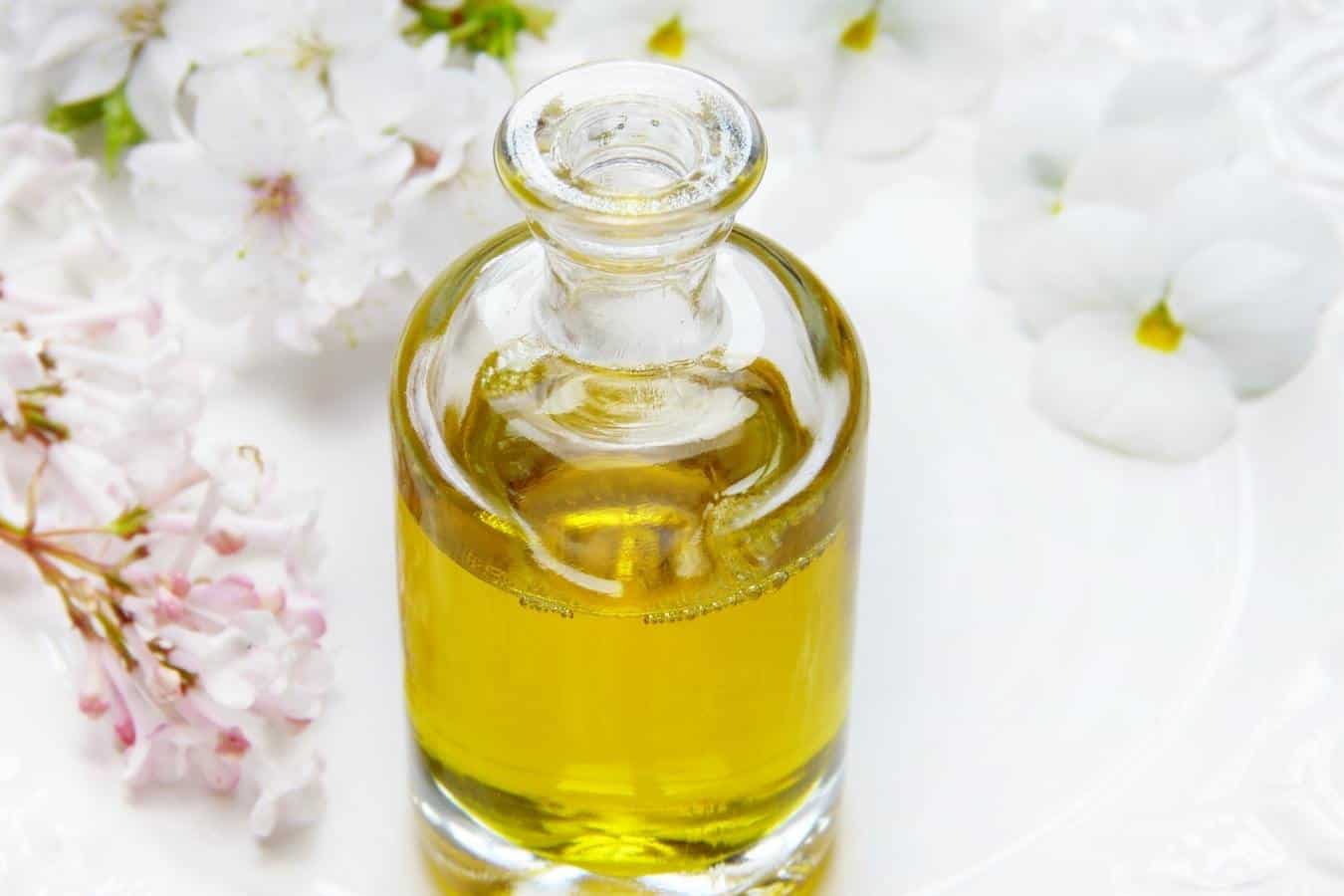Jojoba oil has become increasingly popular in the hair community over the coming years, but should you use it on your natural hair?

What Is Jojoba Oil?
Jojoba oil is the oil that’s extracted from the seed of the Simmondsia Chinensis plant.
Jojoba oil is made up of 54% wax, but it will become liquid at room temperature. This natural oil is added to many beauty products due to its highly moisturizing properties.
It contains Vitamin E, Vitamin C, B vitamins, zinc, and copper. Jojoba oil is commonly used in skincare and haircare products to relieve dry skin and keep it looking healthy.
Related: The 15 best gels for 4C Hair
5 Benefits Of Jojoba Oil For Natural Hair
Jojoba oil is a great addition to your hair care routine and it’s beneficial for natural hair as it contains an abundance of vitamins and minerals to nourish the hair strands and promote growth.
Here are the top 5 benefits of using jojoba oil:
1. Improves Scalp Health
Jojoba oil contains antioxidants that target dandruff and itchy scalps by eliminating bacteria and debris, which will soothe and calm any irritation.
Keeping the scalp clean and healthy helps to promote growth and protect the hair against damage.
2. Hydrates Hair
The vitamins and minerals in jojoba oil are responsible for nourishing the hair and reducing dry, frizzy strands.
When used frequently as a deep conditioning treatment, jojoba oil can reverse damaged hair and prevent breakage.
Dull, brittle hair will become shinier, smoother, and more manageable.
3. Promotes Growth
Jojoba oil contains a high amount of fatty acids, which are known to add shine and promote hair growth.
Jojoba mimics sebum that’s produced by the skin so that when it’s applied to the scalp, it can help regulate sebum production to prevent an underproduction and overproduction of the hair’s natural oils.
This is important because too little sebum can cause dryness and brittle strands, but too much oil can result in excessively oily hair.
Finding that balance helps to achieve a healthy scalp, resulting in stronger and healthier hair overall.
4. Can Prevent Hair Loss
There are some claims that jojoba oil can reverse hair loss by providing hydration to the hair follicles and stimulating sebum production, thus preventing dryness and reducing hair fall.
Jojoba oil contains essential vitamins that can strengthen the hair, leading to less breakage.
To prevent and reverse hair loss, a weekly hot oil treatment would be beneficial for many people, especially those with dry or damaged hair.
5. Adds Shine And Softness
Thanks to the nutrients in jojoba oil, applying it to the hair can improve the overall condition of your hair, turning dry, frizzy hair into shiny, manageable locks.
As jojoba oil is lightweight, it can be used as a sealant or leave-in conditioner for people with dry, thick, or naturally curly hair as it won’t weigh the hair down as some other oils do.
Like this? Read our guide on the best hair dryers for natural hair.
Things To Consider When Purchasing Jojoba Oil

There are many benefits to using jojoba oil for natural hair, but here are a couple of things to consider first.
Is It 100% Pure
You need to be mindful when shopping, especially when it’s for hair oils.
The reason for this is there are many sellers who offer products that are not genuine and this can result in the poor condition of your hair and scalp.
In the worst-case scenario, it can cause a reaction. Genuine, high-quality jojoba oil will be a clear, golden color and it won’t contain any additional ingredients.
Look out for products that are 100% pure, organic, and GMP quality assured. And always check reviews before buying.
This will ensure that you are getting the best quality oil.
The Porosity Of Your Hair
Generally, jojoba oil does work well for most hair types, but it works best on low porosity hair.
The reason for this is that low porosity hair has a harder time absorbing oils, which means that heavier oils will sit on the surface, making it appear greasy.
Whereas high porosity hair often requires thicker and heavier oils to penetrate the hair strands and provide hydration.
If you have high porosity hair, jojoba oil could still be a great choice, but if your hair is very dry you might need to mix it with a heavier oil with higher penetration like coconut oil or olive oil.
What You Intend To Use It For
Jojoba oil has abilities to soothe and condition the hair, but it’s not a miracle cure.
Many people believe they can treat hair loss just by putting jojoba oil on the hair and scalp, but sadly, this is often not the case.
While it might help to prevent hair loss in some individuals, it shouldn’t be used to treat an ongoing condition.
You should always consult a doctor about any hair loss you’re experiencing before opting for natural remedies.
Oils are great for the hair, but they aren’t always the solution to the problem.
How To Use Jojoba Oil For Natural Hair
Hot Oil Treatment
Heating up the oil before applying it to the hair and scalp helps to improve the absorption rate, which provides better results.
Simply add 1 – 3 tablespoons of jojoba oil to a microwaveable bowl and heat it up for a few seconds until it is warm enough.
Never apply the oil when it’s hot – always do a patch test first. You can choose to mix jojoba oil with another oil to dilute it and make the mixture thinner or thicker, depending on your needs.
If you are treating dandruff or an itchy scalp, adding 2 – 3 drops of tea tree oil can help to improve the health of your scalp.
Instructions
- Start by massaging the oil into the roots. If this area is particularly oily already, you can avoid it, but most people can benefit from a scalp massage
- Use your fingertips to work the oil into the scalp, apply medium pressure to remove dead skin cells and build up
- Work your way down to the lengths of the hair and the ends, making sure that each section of hair is fully coated
- Leave the oil in for at least 20 minutes, but if you have the time leave it in for a little bit longer
- Wash out with shampoo and conditioner. Repeat, if necessary
Split End Treatment
The ends of the hair are the most susceptible to dryness and breakage.
In the colder months, this can lead to split ends and breakage. You can avoid this by limiting heat styling tools and using the right products for your hair type.
But most people will need some extra TLC to keep the ends hydrated.
Putting jojoba oil on the ends of the hair will help to prevent split ends and promote growth.
Instructions
- Warm up 1 teaspoon to 1 tablespoon of oil in your hands or in the microwave and apply it carefully to the ends of the hair only
- Leave it on during the day or apply before you go to sleep. Do not rinse!
This split end treatment can be done every other day or whenever you notice your ends getting too dry.
Add To Hair Products
An easy and effective way to add jojoba oil into your hair care routine is to add a few drops to your natural shampoo and conditioner.
This might be preferable for people who have very oily hair and don’t want the oil to weigh the hair down, as the oil will be diluted.
How Often Should You Use Jojoba Oil?
Jojoba oil can be used daily, depending on how you are using it and the condition of your hair.
Generally speaking, it’s not a great idea to put oil on your scalp every day because this can clog the pores and weigh the hair down over time.
Hot oil treatments are very beneficial for natural hair, but they usually only need to be done once a week.
If you’re adding a few drops to your hair products, this can be done every hair washing day because it’s diluted and will not weigh the hair down.
If you’re using jojoba oil to treat split ends, this can be done every other day because the ends can get extremely dry, and this will help to combat that.
Things You Should Know Before Using Jojoba Oil
Jojoba oil is a lightweight oil, which makes it suitable for most hair types, but it’s especially beneficial for people with thinner or fine hair, as it won’t weigh the hair down as much as heavier oils.
People with thicker or drier hair might benefit from mixing jojoba oil with a thicker, highly penetrative oil such as coconut oil, as this enhances the moisturizing benefits.
As with most oils, you should use them sparingly at first.
While it’s rare to have an allergy or sensitivity to jojoba oil, there is a chance that it might not be suitable for your hair and scalp.
Use a few drops, to begin with, and look for any reaction over the coming days. If a reaction occurs, discontinue use and find an alternative oil.
Disclaimer: This site is not intended to provide professional or medical advice. All of the content on LovedByCurls.com is for informational purposes only. All advice should be followed at your own discretion. Ingredients may change at any time so always check the product label before using. Check our full disclaimer policy here.
